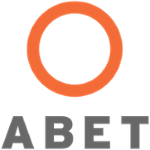Main Content
Program Objectives & Student Outcomes
Accreditation
Our Bachelor of Science (BS) in Electrical Engineering program is accredited by the Engineering Accreditation Commission (EAC) of ABET, under the commission’s General Criteria and the Program Criteria for Electrical, Computer, Communications, Telecommunication(s), and Similarly Named Engineering Programs.

The fundamental goal of the undergraduate program in Electrical Engineering is to offer a high-quality education, designed to achieve the following specific educational objectives and student outcomes:
Program Educational Objectives (PEOs)
Within a few years of graduation, Electrical Engineering graduates are expected to attain:
- Increasing responsibility beyond that in their entry-level description in job functions within Electrical Engineering or related employment, and/or
- Successful progress within graduate degree programs in Electrical Engineering or other professional degrees such as other Engineering, Business, Law or Medicine, and
- Continued successful professional development and adaptation to evolving technologies within their chosen field.
Enrollment:
Number of students enrolled in Electrical Engineering as a 1st major
| Fall 2021 | Fall 2022 | Fall 2023 | Fall 2024 | Fall 2025 |
|---|---|---|---|---|
| 84 (97) | 53 (69) | 51 (64) | 66 (66) | 56 (61) |
( ) shows number of students with Electrical Engineering as a 1st or 2nd major
| Fall 2021 | Fall 2022 | Fall 2023 | Fall 2024 | Fall 2025 |
|---|---|---|---|---|
| 28 | 38 | 14 | 7 | 17 |
Student Outcomes (SOs)
- SOLVE: an ability to identify, formulate, and solve complex engineering problems by applying principles of engineering, science, and mathematics
- DESIGN: an ability to apply engineering design to produce solutions that meet specified needs with consideration of public health, safety, and welfare, as well as global, cultural, social, environmental, and economic factors
- COMMUNICATE: an ability to communicate effectively with a range of audiences
- JUDGE: an ability to recognize ethical and professional responsibilities in engineering situations and make informed judgments, which must consider the impact of engineering solutions in global, economic, environmental, and societal contexts
- COOPERATE: an ability to function effectively on a team whose members together provide leadership, create a collaborative and inclusive environment, establish goals, plan tasks, and meet objectives
- EXPERIMENT: an ability to develop and conduct appropriate experimentation, analyze and interpret data, and use engineering judgment to draw conclusions
- LEARN: an ability to acquire and apply new knowledge as needed, using appropriate learning strategies.
Advanced Courses
The flexibility of the electrical engineering curriculum allows the students to choose among advanced courses in the theory and applications of circuits, systems, control, signal processing, communications, digital systems, power systems, electronics, gaseous electronics, optics, electrooptics, electromagnetics, antennas and propagation.
Technical Areas
Employment opportunities exist within a wide range of organizations, such as computer, semiconductor, aviation, electronics, microelectronics, broadcasting, telecommunications, defense, automotive, manufacturing and electric power companies, state and federal agencies and laboratories. Employment opportunities cover the spectrum of engineering activities, ranging from research and development, to systems analysis, automation, manufacturing, customer service and support, marketing and sales.



